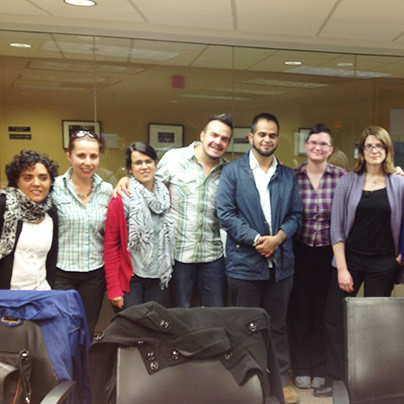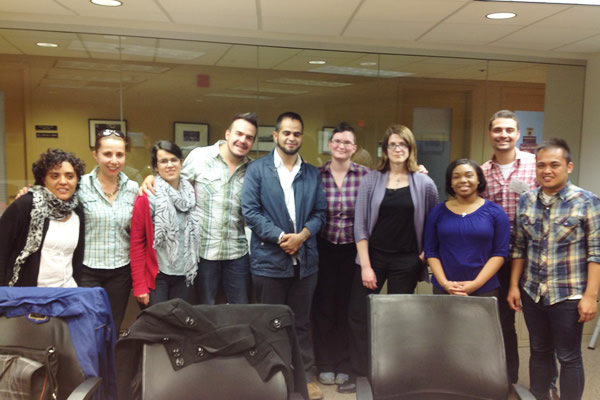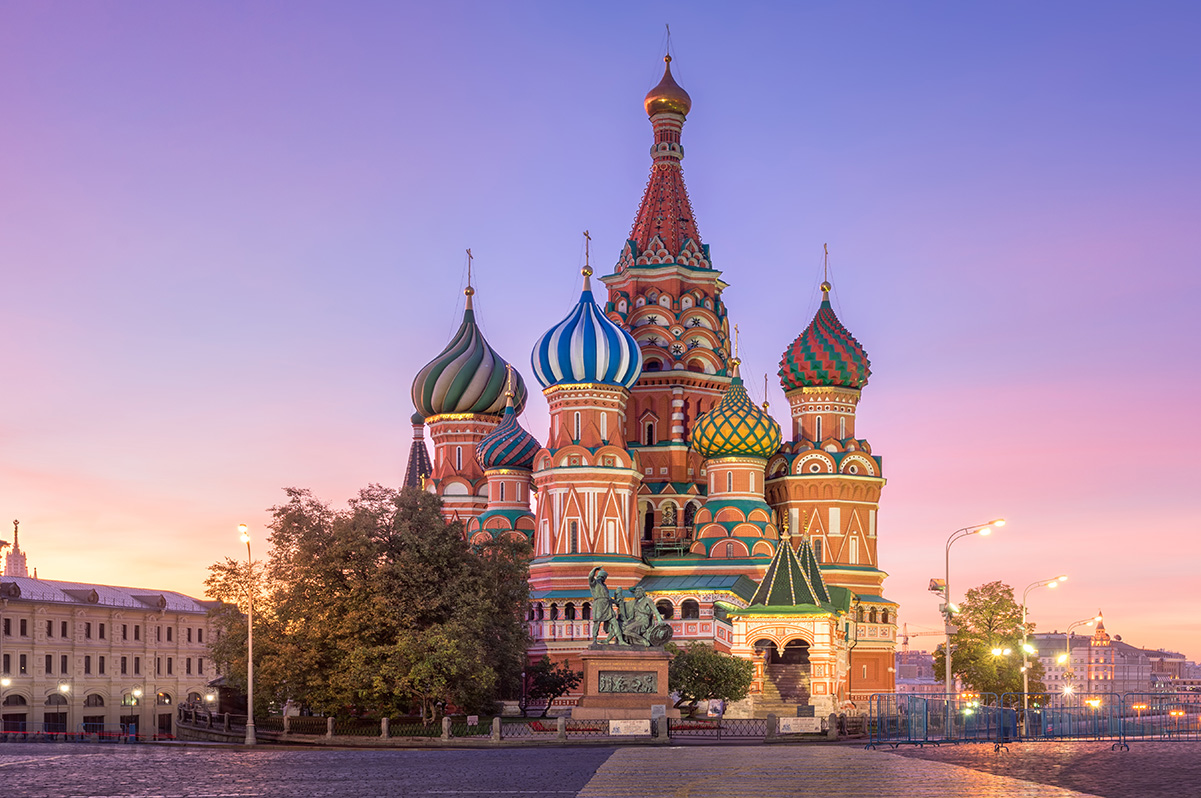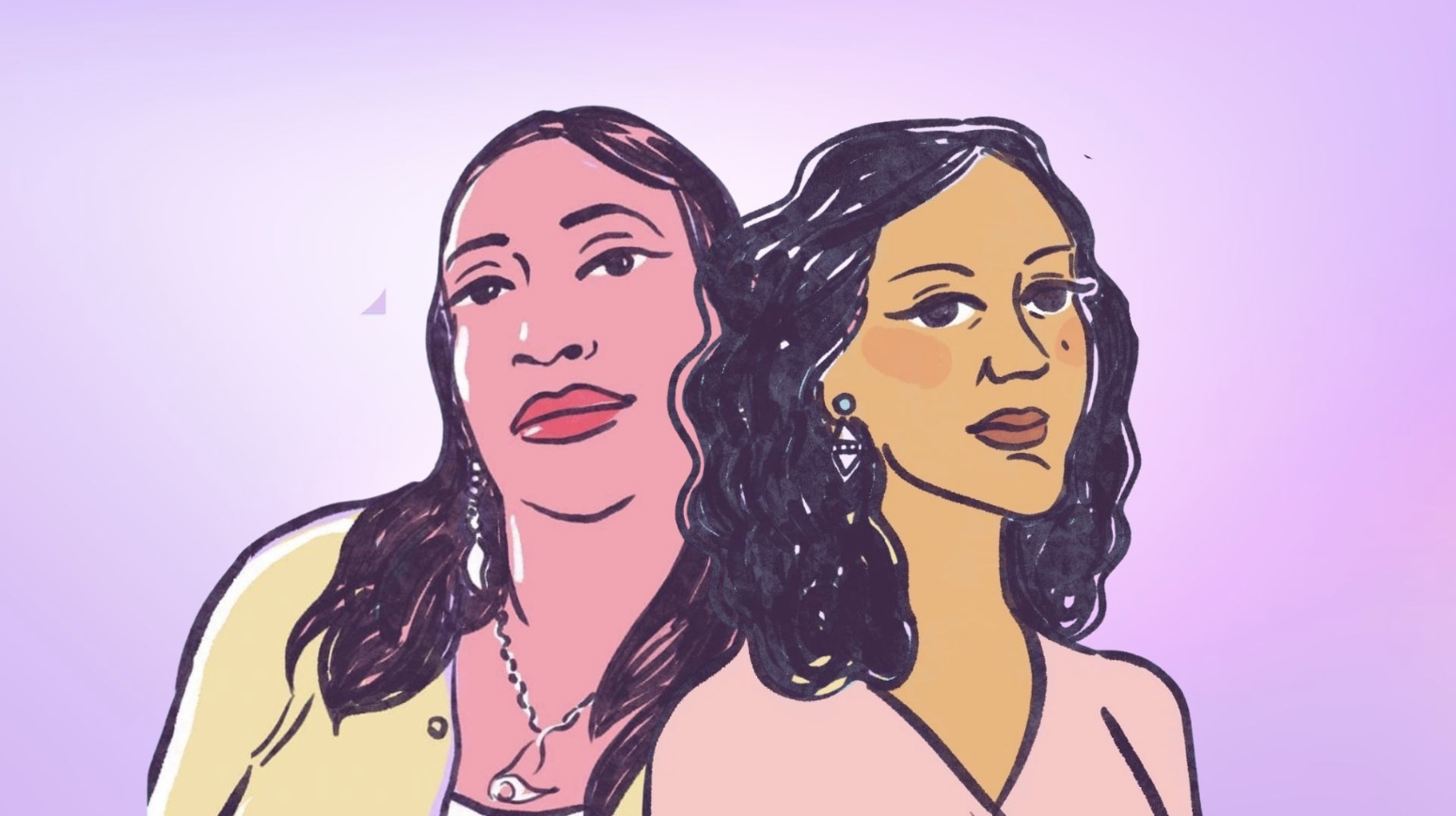World
Colombian LGBT rights advocates visit U.S.
Six activists took part in State Department-sponsored trip


Colombian LGBT rights advocates are in the U.S. on a State Department-sponsored trip. (Photo courtesy of Wilson Castańeda)
Six Colombian LGBT rights advocates have visited D.C. and two other states this month as part of a State Department-sponsored trip to learn how activists, politicians and government officials in this country advance civil and human rights.
The group — which includes lawyer Viviana Baharquez Monsalve; Wilson de Jesús Castañeda Castro, director of Corporación Caribe Afirmativo in Cartagena; Juan Carlos Pietro García, director of the city of Bogotá’s Office of Sexual Diversity and Federico Ruíz Mora of the Santamaría Fundación in Cali — arrived in D.C. on April 14.
The advocates met with State Department officials, Lisa Mottet of the National Gay and Lesbian Task Force, Human Rights Campaign and Victory Fund staffers, transgender activists and others while in the nation’s capital. They will have also traveled to Des Moines, Iowa, and San Diego before returning to Colombia on Wednesday.
Castañeda, whose group advocates on behalf of LGBT Colombians who live along the country’s Caribbean coastline, told the Washington Blade during an April 18 interview that he and his fellow activists highlighted their work on behalf of their gay, lesbian, bisexual and trans countrymen. He said they also wanted to learn about this country’s elections, documentation of hate crimes and anti-bullying efforts in schools while in the United States.
Ruíz, whose group advocates on behalf of trans women, discussed how the Colombian LGBT rights movement compares to that in the United States.
“Things are rather similar to those in our country, but there are clearly obvious differences,” he said.
The activists arrived in the United States less than a month after the U.S. Supreme Court heard oral arguments in two cases that challenge the constitutionality of California’s Proposition 8 and the Defense of Marriage Act. Their trip also coincided with the ongoing debate over a bill that would extend marriage rights to same-sex couples in Colombia.
The Colombian Senate had been scheduled to vote on the proposal on April 18 — the same day the activists spoke with the Blade, but it was postponed until Tuesday. Baharquez said it will prove “very, very difficult” to pass the same-sex marriage bill because of opposition from religious conservatives in the country’s Congress.
“There is little hope that something is going to pass,” she said.
Colombian senators in 2007 defeated a bill that would have allowed gays and lesbians to enter into civil unions.
The country’s Constitutional Court in three separate rulings it issued later that year and in 2008 extended property and inheritance rights, social security and pension benefits to same-sex couples. The tribunal in 2009 issued a ruling that said co-habitating gay and lesbian couples must receive the same rights that unmarried heterosexual couples receive under Colombian law.
The same court in 2011 ruled lawmakers must pass legislation within two years that extends the same benefits that heterosexuals receive through marriage to same-sex couples. If legislators fail to act on this mandate by June 20, gays and lesbians can legally register their unions.
Anti-trans violence remains endemic in Colombia
While attention remains focused on extending marriage rights to same-sex couples, violence against trans women remains rampant throughout the country.
A report from the Latin American and Caribbean Network of Transgender Women (REDLACTRANS) notes 61 trans women in Colombia have been reported murdered between 2005-2011. The group further notes none of the alleged perpetrators have been prosecuted — Ruíz said authorities often exacerbate the problem.
“Colombia is the same as many Latin American countries and others around the world; the trans community is that which is the most affected,” he said as he discussed the issue. “This has to do with historic discrimination and exclusion accompanied by systematic acts of violence. This violence has to do with transphobic acts because of [the victim’s] gender identity.”
The advocates hope to launch a campaign in support of a trans rights bill that would, among other things, “guarantee a dignified life for trans women in Colombia.” Ruíz further described them as those who are “in a helpless situation against the constant violation of their human rights.”
Argentine President Cristina Fernández de Kirchner in May 2012 signed a bill that allows people who have not undergone sex-reassignment surgery to legally change their gender without a doctor or judge’s approval. The law further mandates public and private health insurance plans to cover SRS, hormone therapy and other trans-specific treatments without additional premiums.
Castañeda told the Blade the campaign through which Argentine LGBT rights advocates secured passage of their country’s trans rights bill is “important to us.” He stressed, however, their own effort should take into account the “particularity of the situation” that trans Colombians currently face with regard to discrimination and violence.
Ruíz also responded to the Blade’s question about whether the ongoing same-sex marriage debate has overshadowed the need to extend legal protections based on gender identity and expression.
“It is an advance in the recognition of rights as a group,” he said, while noting some trans women don’t identify much with the issue of nuptials for gays and lesbians. “For the trans organizations, it will be much more important that gender identity is recognized as an identify for the purposes of rights.”
In addition to efforts in support of same-sex marriage and trans rights, the advocates said they will continue to seek LGBT inclusion in the ongoing peace profess between the Colombian government and armed rebels. They also hope to have a greater presence in the country’s political system.
The U.S. Agency for International Development earlier this month announced a public-private partnership designed to promote LGBT rights around the world. The Victory Institute and the Astraea Foundation will conduct the initiative’s first training in Bogotá, the Colombian capital, from May 30-June 2.
Bogotá City Councilor Angelica Lozano; Blanca Durán, mayor of the Colombian capital’s Chapinero district and Tatiana Piñeros, a trans woman whom Bogotá Mayor Gustavo Petro appointed last year to run the city’s social welfare agency are among those expected to attend.
“For those of us who have come to the United States, we identified and built upon best practices to know and use in our daily work,” Prieto said.
Russia
Russia designates ILGA World an ‘undesirable’ group
Justice Ministry announced designation on Jan. 21

Russia has designated a global LGBTQ and intersex rights group as an “undesirable” organization.
ILGA World in a press release notes the country’s Justice Ministry announced the designation on its website on Jan. 21.
The ministry’s website on Tuesday appeared to be down when the Washington Blade tried to access it. ILGA World in its press release said the designation — “which also reportedly includes eight other organizations from the United States and across Europe” — “has been confirmed by independent sources.”
“ILGA World received no direct communication of the designation, whose official reasons are not known,” said ILGA World.
The Kremlin over the last decade has faced global criticism over its crackdown on LGBTQ rights.
ILGA World notes Russians found guilty of engaging with “undesirable” groups could face up to six years in prison. The Russian Supreme Court in 2023 ruled the “international LGBT movement” is an extremist organization and banned it.
“Designating human rights groups ‘undesirable’ is outlandish and cynical, yet here we are,” said ILGA World Executive Director Julia Ehrt. “But no matter how much governments will try to legislate LGBTI people out of existence, movements will stay strong and committed, and solidarity remains alive across borders. And together, we will continue building a more just world for everyone.”
Honduras
Corte IDH reconoce a Thalía Rodríguez como familia social de Leonela Zelaya
Se construyeron una familia tras más de una década de convivencia

Por DORIS GONZÁLEZ * | TEGUCIGALPA, Honduras — En la sentencia del caso Leonela Zelaya y otra vs Honduras emitida por la Corte Interamericana de Derechos Humanos se estableció un hito jurisprudencial para las personas LGBTQ en Honduras, así como en la región en relación a las diversas conformaciones de familias existentes. La Corte IDH interpretó por primera vez el concepto de familia social, indicando que la construcción de familia no debe restringirse a la familia nuclear o a nociones tradicionales, bajo el entendido de que hay diferentes formas en las que se materializan los vínculos familiares.
Este análisis se trae a colación debido al contexto de discriminación, prejuicio y violencia que atravesamos las personas LGBTQ, el cual se puede manifestar incluso dentro de nuestras propias familias. Esta violencia se manifiesta a través de actos de odio como ser el desarraigo familiar, violencia física, psicológica, social, económica, expulsiones de los hogares, violaciones correctivas e incluso, culminando en muertes violentas. Esta violencia motivada por la orientación sexual, identidad y expresión de género de las personas imposibilita la convivencia familiar.
Ante esto, las personas LGBTQ construimos vínculos sociales fuera del vínculo familiar tradicional, los cuales a través de la convivencia, amistad, apoyo económico-social y construcción de vida en común constituyen familias, tal como ocurrió en este caso.
Tras el abandono de su familia biológica, Leonela Zelaya y Thalía Rodríguez construyeron una familia tras más de una década de convivencia, en los cuales se apoyaron mutuamente en diversas situaciones, viviendo como mujeres trans, portadoras de VIH, ejerciendo el trabajo sexual y en situación de pobreza, enfrentando constantes episodios de detenciones arbitrarias y violentas por parte de los órganos policiales.
Tras su asesinato, fue Thalía quien recogió el cuerpo de Leonela en la morgue de Tegucigalpa y quien gestionó el féretro a través de la Funeraria del Pueblo. Los servicios fúnebres de Leonela Zelaya fueron realizados en un bar por mujeres trans, trabajadoras sexuales, al cual no asistió ningún miembro de su familia biológica.
El asesinato de Leonela y la falta de esclarecimiento generaron a Thalía un sentimiento de inseguridad, frustración e impotencia. Por estas violaciones de derechos humanos, la Corte reconoció a Thalía Rodríguez, en calidad de familiar de Leonela, como víctima del caso, generando estándares aplicables a todas las personas LGBTQ.
A juicio de la Corte, esta situación lleva a que, en casos de muertes violentas de mujeres trans, las personas que integren las redes de apoyo de la persona fallecida puedan ser declaradas víctimas por la violación de sus derechos a la integridad psíquica o moral, siempre que se acredite la existencia de un vínculo estrecho con la víctima y una afectación a sus derechos, derivada, por ejemplo, de las gestiones realizadas para obtener justicia. Esta sentencia logra reconocer que las personas LGBTQ construimos familias sociales, familias elegidas, e indica que estas deben ser reconocidas y validadas.
* Abogada litigante del caso Leonela Zelaya y otra vs Honduras, Red Lésbica Cattrachas
Uganda
LGBTQ Ugandans targeted ahead of country’s elections
President Yoweri Museveni won 7th term in disputed Jan. 15 vote

Barely a week after Ugandan President Yoweri Museveni secured a 7th term in an election marred by state violence, intimidation, and allegations of fraud, the country’s queer community spoke about how the election environment impacted it.
The LGBTQ lobby groups who spoke with the Washington Blade noted that, besides government institutions’ failure to create a safe and inclusive environment for civic participation by all Ugandans, authorities weaponized the Anti-Homosexuality Act to silence dissent and discourage queer voter engagement.
The rights groups note that candidates aligned with Museveni’s ruling National Resistance Movement — including Parliament Speaker Anita Among — during the campaigns accused their rivals of “promoting homosexuality” to discredit them while wooing conservative voters.
Queer people and LGBTQ rights organizations as a result were largely excluded from the formal political processes for the election as voters, mobilizers, or civic actors due to fear of exposure, stigma, violence, and legal reprisals.
“This homophobic rhetoric fueled public hostility and emboldened vigilante violence, forcing many queer Ugandans into deeper hiding during the election period,” Uganda Minority Shelters Consortium Coordinator John Grace stated.
Some queer people had expressed an interest in running for local council seats, but none of them formally registered as candidates or campaigned openly because of safety concerns and local electoral bodies’ discriminatory vetting of candidates.
“UMSC documented at least three incidents of election-related violence or intimidation targeting LGBTQ+ individuals and activists,” Grace noted. “These included harassment, arbitrary detentions, extortions by state and non-state actors, digital cat-fishing, and threats of outing.”
Amid such a militarized and repressive election environment, Let’s Walk Uganda Executive Director Edward Mutebi noted queer-led and allied organizations engaged in the election process through restricted informal voter education, community discussions, and documenting human rights violations.
“Fear of backlash limited visibility and direct participation throughout the election cycle,” Mutebi said. “But despite the hostile environment of work, Let’s Walk Uganda was able to organize a successful transgender and gender diverse youth training on electoral security and safety.”
Museveni’s government escalated its repressive actions during the Jan. 15 elections by shutting down the internet and suspending nine civil society organizations, including Chapter Four Uganda and the National Coalition of Human Rights Defenders, for allegedly engaging in activities that are prejudicial to the security and laws of the country.
The suspension of the rights organizations remains in force, an action both Mutebi and Grace condemn. They say it prevents queer Ugandans from accessing urgent services from the affected groups.
“For the LGBTQ community, the impact has been immediate and deeply harmful. Many of the suspended organizations, like Chapter Four Uganda, were critical partners in providing legal representation, emergency response, and documentation of rights violations,” Grace said.
This has compelled UMSC and its other partners to handle increased caseloads with limited resources, while navigating heightened scrutiny and operational risk.
“The suspension has disrupted referral pathways, delayed urgent interventions, and weakened collective advocacy for marginalized groups and minority rights defenders, which calls for urgent international solidarity, flexible funding, and protection mechanisms to safeguard the work of grassroots organizations operating under threat,” Grace stated.
Mutebi warned that such repressive actions are tyrannical and are indicative of shrinking civic space, which undermines democratic accountability as the promotion and protection of human rights is ignored.
With Museveni, 81, extending his tenure at State House from a landslide win of 72 percent, UMSC and LWU consider a bleak future in the protection of rights for queer Ugandans and other minority groups.
“Without significant political and legal shifts, LGBTQ persons will face continued criminalization, reduced civic space, and heightened insecurity, making sustained advocacy and international solidarity more critical than ever,” Mutebi said. “ It is unimaginable how it feels to live in a country with no hope.”
Grace, however, affirmed the resistance by local queer lobby groups will continue through underground networks, regional solidarity, and digital organizing.
The duo noted that a win by Museveni’s main challenger and rapper, Bobi Wine, who only managed 24 percent of the total votes cast, could have enabled the opening up of civil space and human rights protections in Uganda.
Wine, for his part, spoke in favor of the respect for the rule of law and human rights during his campaign.
“While Bobi Wine’s past stance on LGBTQ rights was inconsistent, his recent shift toward more inclusive rhetoric and international engagement suggested a potential opening for dialogue,” Grace said. “A win might have created space for policy reform or at least reduced state-sponsored homophobia, though structural change would still require sustained pressure and coalition-building.”
Mutebi stated that a change in Uganda’s leadership to a youthful leader like Wine could have offered an opening, but not a guarantee for progress on inclusion and human rights. Mutebi added existing institutionalized and societal homophobia remain in place.

















